PRINCETON, NJ -- Democrats nationally who have followed the controversy surrounding the relationship between Barack Obama and his former minister, the Rev. Jeremiah Wright, say by a 2-to-1 margin that Obama's association with Wright is not meaningful and should not be discussed in the campaign, while a majority of Republicans disagree.
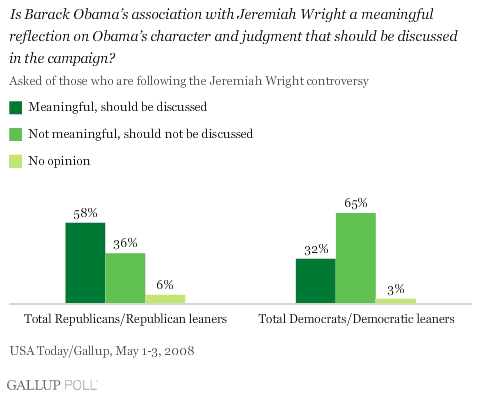
About three-quarters of Democrats who are Hillary Clinton supporters and 8 out of 10 Obama supporters say they have followed the Jeremiah Wright controversy. Perhaps not surprisingly, there is a significant difference in the way Democrats view this matter based on the candidate they support. Clinton supporters who have followed the controversy believe, by a slight majority, that the story should be discussed in the campaign because it is a meaningful reflection on Obama's character (and in this way, they agree with Republicans). Even though Obama himself admitted on NBC's Meet the Press Sunday that his relationship to Wright is a legitimate campaign topic, Obama supporters overwhelmingly say it should not be discussed in the campaign.
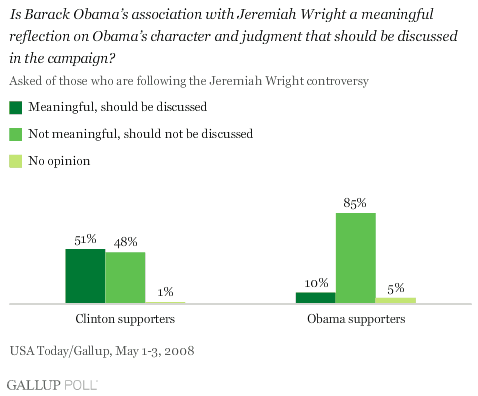
The major short-term focus of the Wright controversy has been its potential impact on the race for the Democratic nomination. It is clear from the USA Today/Gallup poll data that it could be having some impact because Clinton supporters appear to be at least somewhat prone to take the controversy into account in assessing Obama -- certainly more so than are Obama's own supporters.
Almost 3 out of 10 Clinton supporters who have followed the controversy say Obama agrees with the more controversial comments Wright has made. The vast majority of Obama supporters, almost 9 out of 10, believe that Obama disagrees with Wright's more controversial statements.
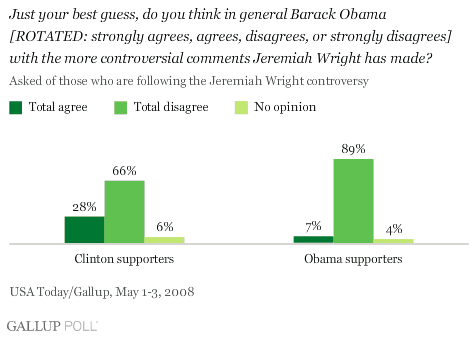
Additionally, 9 out of 10 Obama supporters believe Obama has handled the controversy well, a sentiment that a lower percentage -- albeit still a majority -- of 66% of Clinton supporters agree with.
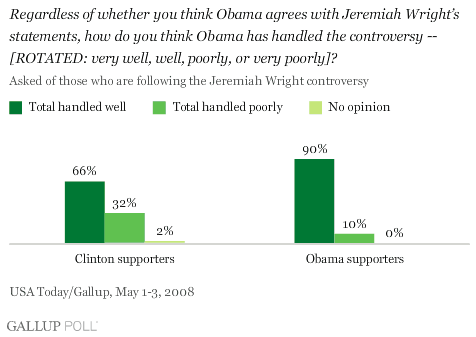
Asked directly whether Obama's association with Wright has made them more likely or less likely to vote for Obama, or whether it does not affect their vote, Obama supporters overwhelmingly say it makes no difference to them. On the other hand, a little less than a third of Clinton supporters say the association between Wright and Obama has made them less likely to vote for Obama. (These answers are among all Clinton and Obama supporters, regardless of how closely they have been following the controversy.)
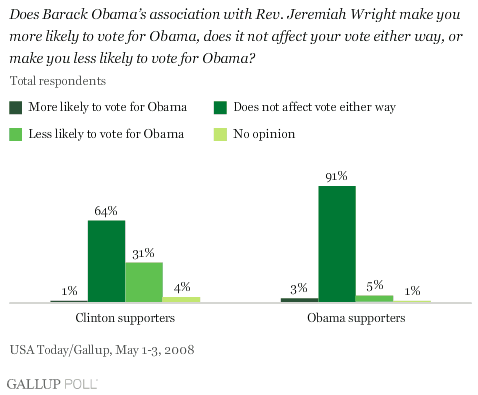
The Thursday through Saturday poll shows that Obama's unfavorable rating is up slightly from last month among Democrats.
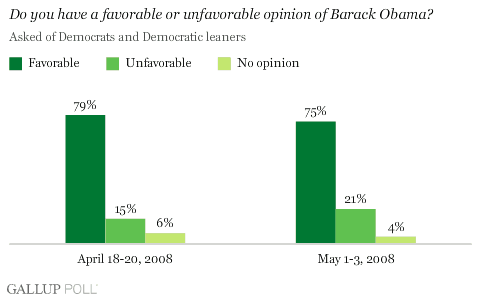
A detailed look at the trends on Obama's favorables by nomination support show that Obama became slightly less popular among Clinton supporters, while his almost universally favorable rating among his own supporters stayed the same.
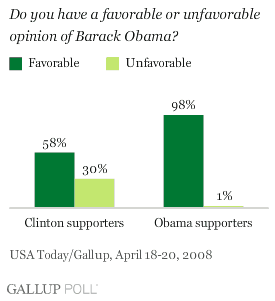
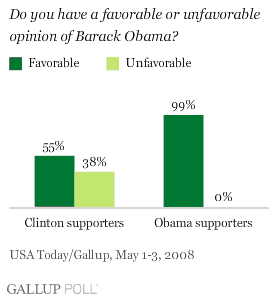
Bottom Line
It is sometimes difficult to tease out the specific impact of a high-profile news event on the fortunes of candidates in the middle of a heated presidential campaign. The data reviewed above indicate that the Wright controversy certainly seems to have had at least some impact on Democrats who support Clinton and who have followed the controversy. These voters say by a slight majority that the controversy is a legitimate topic for news media to discuss, and a not insignificant minority say Obama agrees with Wright's more controversial statements. About a third of all Clinton supporters say the relationship has made them less likely to vote for Obama. Additionally, Clinton supporters in this latest poll have a slightly less favorable view of Obama than they did two weeks ago.
Of course, it is not known whether the Wright controversy has actually caused some Obama supporters to defect and move into Clinton's camp, or whether it has simply reinforced Clinton supporters' pre-existing attitudes. Whether the controversy will affect the results of Tuesday's Indiana and North Carolina primaries remains to be seen, assuming that a question about it is included in the exit polls from those two states.
Survey Methods
Results are based on telephone interviews with 1,019 national adults, aged 18 and older, conducted May 1-3, 2008. For results based on the total sample of national adults, one can say with 95% confidence that the maximum margin of sampling error is ±3 percentage points.
Interviews are conducted with respondents on land-line telephones (for respondents with a land-line telephone) and cellular phones (for respondents who are cell-phone only).
In addition to sampling error, question wording and practical difficulties in conducting surveys can introduce error or bias into the findings of public opinion polls.
To provide feedback or suggestions about how to improve Gallup.com, please e-mail feedback@gallup.com.
